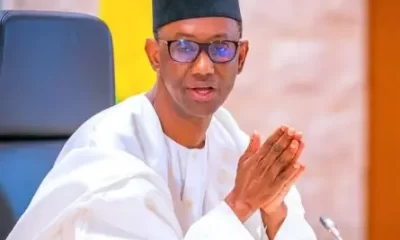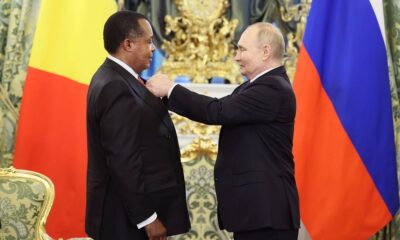Economic Issues
Surviving Nigerians in the Mids of Drained Economic Policy -By Usman Yakubu Usman
Many institutions and sectors are directly bearing the brunt of the sudden turn of the economy. Nigerian currency is not left out. On record, analysis shows how the value of naira fell to N1,339 per dollar in 2024. Recently, the value of the Naira has sadly affected even the citizens studying outside the country. The University World News reported on the grim reality which the students face in Teesside University.

The present Nigerian economic policy is a trial of a death sentence to the citizens. It extinguishes the resolve of humanity and condemns people to eternal misery.
The burden of shrinking economy heavily rested on the poor. Many are in the streets hustling to save their families from needless starvation. If a daily struggle fails, they become trapped in the abyss of hunger. During Buhari’s administration, 63% of people living within Nigeria are poor. This amounts to 133 million Nigerians living in poverty, recorded by the National Bureau of Statistics (NBS). Every year, the figures keep rising, plunging the country into the fog of despair.
The current reality is the trajectory of failed attempts by successive governments to address the economic crisis and ignite hope or set the ground running for the country’s prosperity. Their failure hinges on non transformative policies that are too porous to address human troubles.
For instance, from 2015 to 2023, Buhari’s government created TraderMoni, NPower, Anchor Borrowers Program (ABP) and others through the Central Bank of Nigeria (CBN) to reduce poverty. Basically, through the programs, people are to be paid in cash monthly and be given loans to start a micro investment or to produce farming products to boost the economy. This led to the collection of over N80 trillion debt abroad. But due to poor monitoring, delay and leakages from government officials, the policy failed.
At the end of the administration, people’s woes increase. Some farmers were sent to the courts, other beneficiaries of Npower spent many months without seeing an alert. Accusations of mismanagement and looting garnish media headlines in which Mr Godwin Emefiele, the Central Bank of Nigeria’s governor (CBN) was immediately arrested by President Bola Tinubu’s administration.
Like every government, Tinubu’s sudden drift to power, with the mantra of his Renewed Hope Agenda. The center of his policy is the economy. His first target of implementation is the removal of subsidy. Simply, that the amount paid by the government every year to make petrol cheap for the citizens is to be cut in order to save more money in the treasury to make the economy stable. And no debt will be collected abroad.
As a result, the deepening economic crisis looms, as inflation hits the country. Marketers pour in their blame on the outrageous increase of petrol pump price. Cheap foods like garri, maize, guinea corn etc become more expensive. Citizens walk the land in absolute fear. The policy hit harder than ever expected.
A harrowing tale of Boluwatife Israel, a 17-year-old by the Nigerian national daily, sums up the whole situation. In order to keep living, the boy abandoned school to support his family that is affected by inflation. His ill father spent months on bed beckoning to survive. Tears filled the eyes of Bolu’s mother when she saw the dream of her child slipping away to perdition. No aid comes as more children like Bolu keep wandering in the streets. Children are the worst victims of Nigeria’s poor policy because nobody will like to see school children in the gory evil of child labour.
Many institutions and sectors are directly bearing the brunt of the sudden turn of the economy. Nigerian currency is not left out. On record, analysis shows how the value of naira fell to N1,339 per dollar in 2024. Recently, the value of the Naira has sadly affected even the citizens studying outside the country. The University World News reported on the grim reality which the students face in Teesside University.
It reads: “The students’ woes began when the economic crisis in Nigeria impacted on the value of the currency in the students’ bank accounts – the naira has depreciated by more than 200% against the dollar in the past 12 months – leaving many unable to keep up to date with their tuition fees”. Strangely, the students’ dream for education comes to an abrupt end, leaving their parents suffocated with grief.
In the same manner, the Nigerian Labour Congress (NLC) an organization that represents Nigerian workers feels the sharp pain of the economic policy when they foresee its negative implication on the workers. Their salaries are too meager to hold them on a daily basis with their families. A call for increase beyond the N30,000 minimum wage becomes central to their incessant agitations. To lessen the burden of hardship on its workers, the Labour Union demands N250,000 minimum wage that triggers national debate.
Earlier, when constant agitation of hardship persists on the part of the masses, the Nigerian government intervenes and releases N1billion naira each as palliative to all the governors in the states. Evidently, the money is the profit generated from the petrol. But the gesture makes little or no impact as many government officials are accused of diverting people’s palliatives to their houses. Now, Nigerians wonder how they will benefit from the Tinubu’s economic policy with no job creation, no resounding effort to tackle abject poverty, inflation and punish corrupt public office holders that use the courts and outdated constitution to embezzle public funds with impunity.
It’s a fact that the government ceased to exist in the circle of life when its policies are not feasible to the suffering masses.
Usman Yakubu Usman is a final year student of Usmanu Dafodiyo University Sokoto (UDUS), a campus and freelance journalist whose publications appear on The Nation Newspaper, The Nigerian Tribune, Ripples Nigeria, Campus Reporter Africa and others. He can be reached via mail and phone: usmanyakubuusman@gmail.com. 07038909515.










